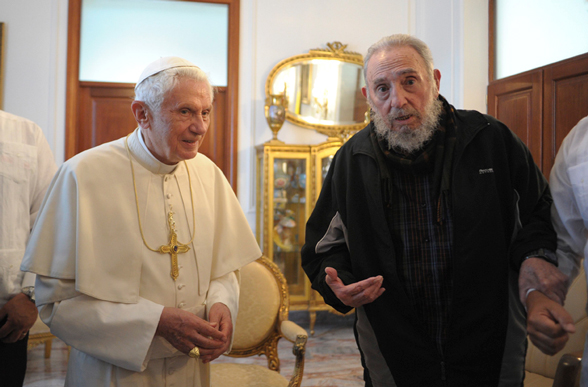Triumph of the Revolution/New Years (January 1): This is the day in commemoration of the
establishment of Fidel Castro’s government. It celebrated the victory of revolution that took place in
1959. It’s also New Years
Day. Cubans like to bring in the new
year with drinks, music, dancing, lots of food, parades, fireworks, friends and
family.
Victory of Armed Forces Day (January 2): It’s
basically a celebration of the armed forces that helped Fidel Castro take over
the previous government. One tradition is that at 12:00 everyone fires a bullet
into the air. Sounds like what the rednecks do on New Years around my house.
Good Friday/Easter (varies): The Cuban government
ended religious holidays when Castro took over in 1959. However, Pope John Paul II was
instrumental in influencing those in control to reinstate Christmas (back in
1998) and Good Friday (in 2012).
People attended a special mass for the first time in nearly half a
century, but even at that, not too many people showed up for it. But many
people watched an address by the cardinal which was broadcast on TV. Apparently, it’s still up in the air on
whether Good Friday will indeed become a permanent national holiday. In other Latin countries these
celebrations are colorful and full of tradition, but there are almost two whole
generations in Cuba who haven’t celebrated these religious holidays before. For
the most part, Cubans will go to church on Easter Sunday and eat a special meal
with friends and family.
Labor Day (May 1): For a country that celebrates
the distribution of work, Labor Day is an important holiday, complete with a
day off and parades and speeches from politicians. It’s also a day to address
the state of the union type of issues and plans for the future. According to
the CIA World Factbook, Cuba has an “official” 3.8% unemployment, and there are
no figures available for the percentage below the poverty level. It’s also
common for human rights activists to use this day to address other issues, such
as torture and unfair/false imprisonment (especially for political dissidents).
Commemoration of the Assault of the Moncada
Garrison (July 25-27): Fidel Castro led about 135 men that he personally
trained to attack and overtake the Moncada Barracks which were located in the
city of Santiago de Cuba. This is often considered the beginning of the
revolution. The actual day of the
attack was July 26, but this holiday celebrates the day before and after as
well. These three days are a very
popular time for street fests, parades, and other community activities.
Independence Day (October 10): This day celebrates
Cuba’s independence from Spain.
Although they also broke from the US, they don’t normally consider that
part of Independence Day (perhaps some do). Typical Independence Day celebrations take place in Cuba:
parades, street fests, music, dancing, lots of food and drinks, flag displays,
games (especially the national pastime baseball), and fireworks.
Christmas (December 25): In the late 1960s, Fidel
Castro decided that Christmas was interfering with sugar production, so he
outlawed it. When Pope John Paul II came to Cuba in later latter part of the
1990s, he convinced them to bring back Christmas, and in 1998 Cubans were able
to celebrate it again for the first time in nearly 30 years. Today, most Cuban
Christians celebrate by attending a midnight mass where the bells officially
ring in Christmas Day at the stroke of midnight. People decorate their homes
and scurry to find gifts as they can afford them and to purchase special food
to share with their families.
Up next: art and literature





Awesome blog CUBA HOLIDAYS AND CELEBRATIONS.
ReplyDeleteThanks for information. But I am looking to attend upcoming Havana Marathon in Cuba. Do you have any update for this event?
ReplyDeleteHi, Martin. I did a quick search about the marathon. It looks like it's going to be held November 16, 2014, so there's still plenty of time to apply. A sight called Insight Cuba will be able to help you with reservations and you have the option of either doing to half-marathon or the full marathon. You can go to www.insightcuba.com/havana-marathon-tours for more information. Best of luck! Let me know if you go and how it went!
ReplyDelete